Bringing a dog into your home is a joyous experience, but for individuals with allergies, it can present a unique challenge. While no dog is entirely “hypoallergenic” in the sense of being 100% allergen-free, many small dog breeds are renowned for their low-shedding coats, which produce significantly less dander—the primary culprit behind pet allergies. These charming canine companions offer the perfect blend of small stature, affectionate personalities, and minimal shedding, making them ideal for apartment living or families seeking a furry friend without the constant battle against pet hair. If you’re looking for delightful pictures of small dog breeds that don’t shed and detailed information about them, you’ve come to the right place. Dive into our comprehensive guide to discover which tiny, low-shedding pups might be the perfect addition to your life.
Understanding “Non-Shedding” and Allergies
The term “hypoallergenic dog” is often misunderstood. It doesn’t mean a dog produces no allergens at all. All dogs produce proteins in their dander (flakes of dead skin), saliva, and urine that can trigger allergic reactions. However, certain breeds are considered hypoallergenic because they shed very little hair, and consequently, release less dander into the environment. This significantly reduces the concentration of allergens in your home, making it easier for allergy sufferers to live comfortably with a canine companion.
Many people mistakenly believe they are allergic to dog hair, but it’s usually the dander, saliva, or urine proteins that cause reactions. Dogs with coats that are curly, wiry, or hairless tend to trap dander within their coats or produce less dander overall. Regular grooming of these breeds is still essential, as it helps remove any trapped dander and loose hairs before they can spread throughout your home. Opting for breeds that are truly dogs that don’t shed too much can make a world of difference for allergy-prone individuals.
Top Small Dog Breeds That Don’t Shed (with Pictures)
Here, we explore some of the most beloved small dog breeds known for their low-shedding coats, perfect for those seeking an allergy-friendly pet. Each description highlights their unique characteristics, temperament, and care requirements.
1. Poodle (Toy & Miniature)
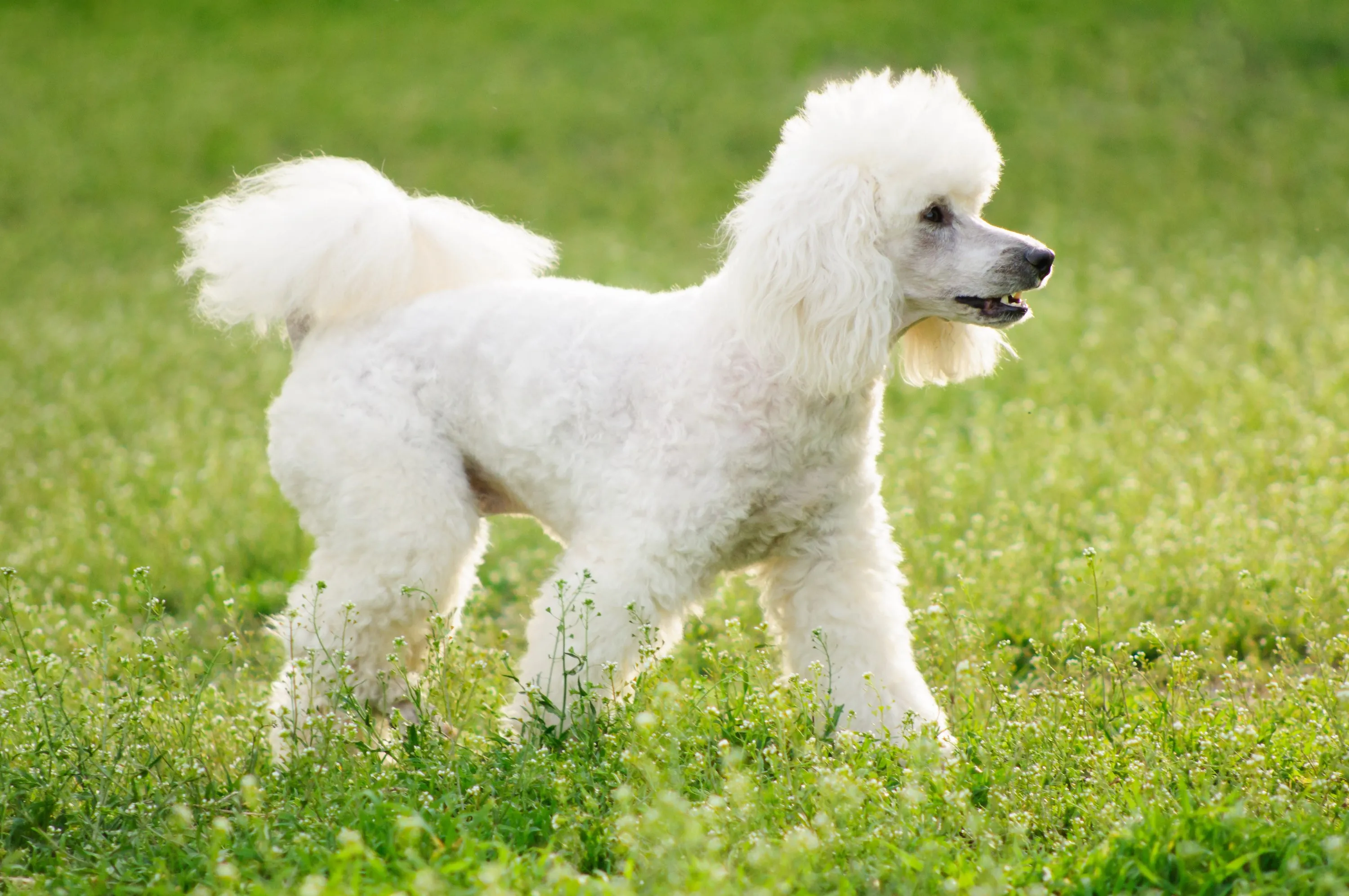 Miniature Poodle walking through grass
Miniature Poodle walking through grass
The Poodle, in its Toy and Miniature varieties, is perhaps the most iconic of all low-shedding breeds. Renowned for their intelligence and elegant curly coats, these pups are highly trainable and make wonderful companions. Toy Poodles typically weigh between 4-6 pounds and stand up to 10 inches tall, while Miniature Poodles range from 10-15 pounds and 10-15 inches. Their dense, curly coat traps shed hair and dander, minimizing its release into the home. However, this beautiful coat requires consistent grooming to prevent matting, including regular brushing and professional clipping every 4-6 weeks. Despite their sophisticated appearance, Poodles are playful and affectionate, thriving on human interaction.
2. Yorkshire Terrier
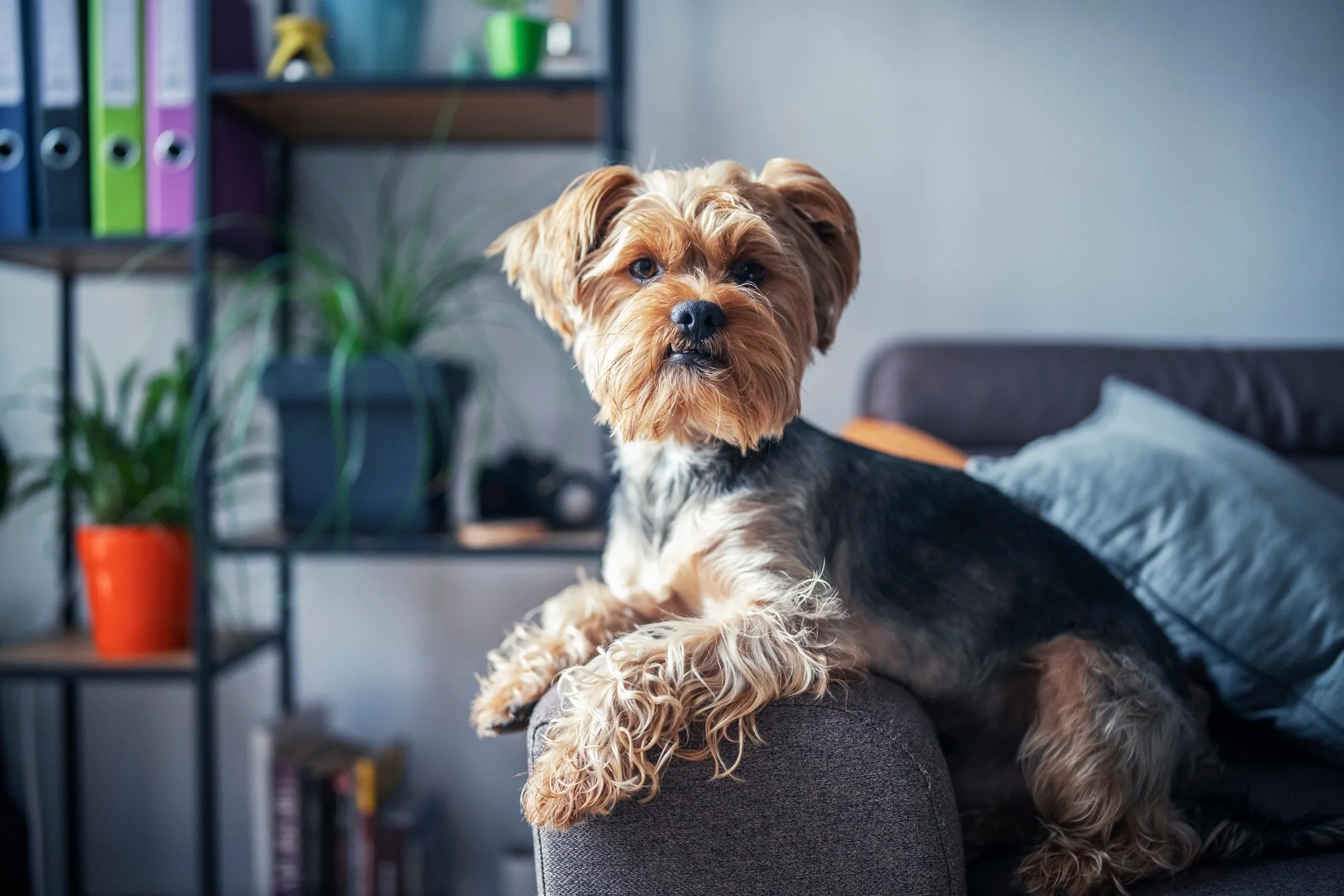 Yorkshire Terrier lounging on an armchair
Yorkshire Terrier lounging on an armchair
The charming Yorkshire Terrier, or Yorkie, is a small yet spirited breed known for its long, silky, non-shedding coat. These spunky little dogs typically weigh between 4-7 pounds and are full of personality, often acting much larger than their size. Their fine, human-like hair requires daily brushing to prevent tangles and maintain its lustrous appearance. Yorkies are adaptable and can thrive in various living situations, from spacious homes to studio apartments, as long as they receive ample attention and mental stimulation. They are affectionate and courageous, making them excellent companions for individuals or families who appreciate a lively, intelligent, and relatively small smart dog breed that doesn’t shed.
3. Shih Tzu
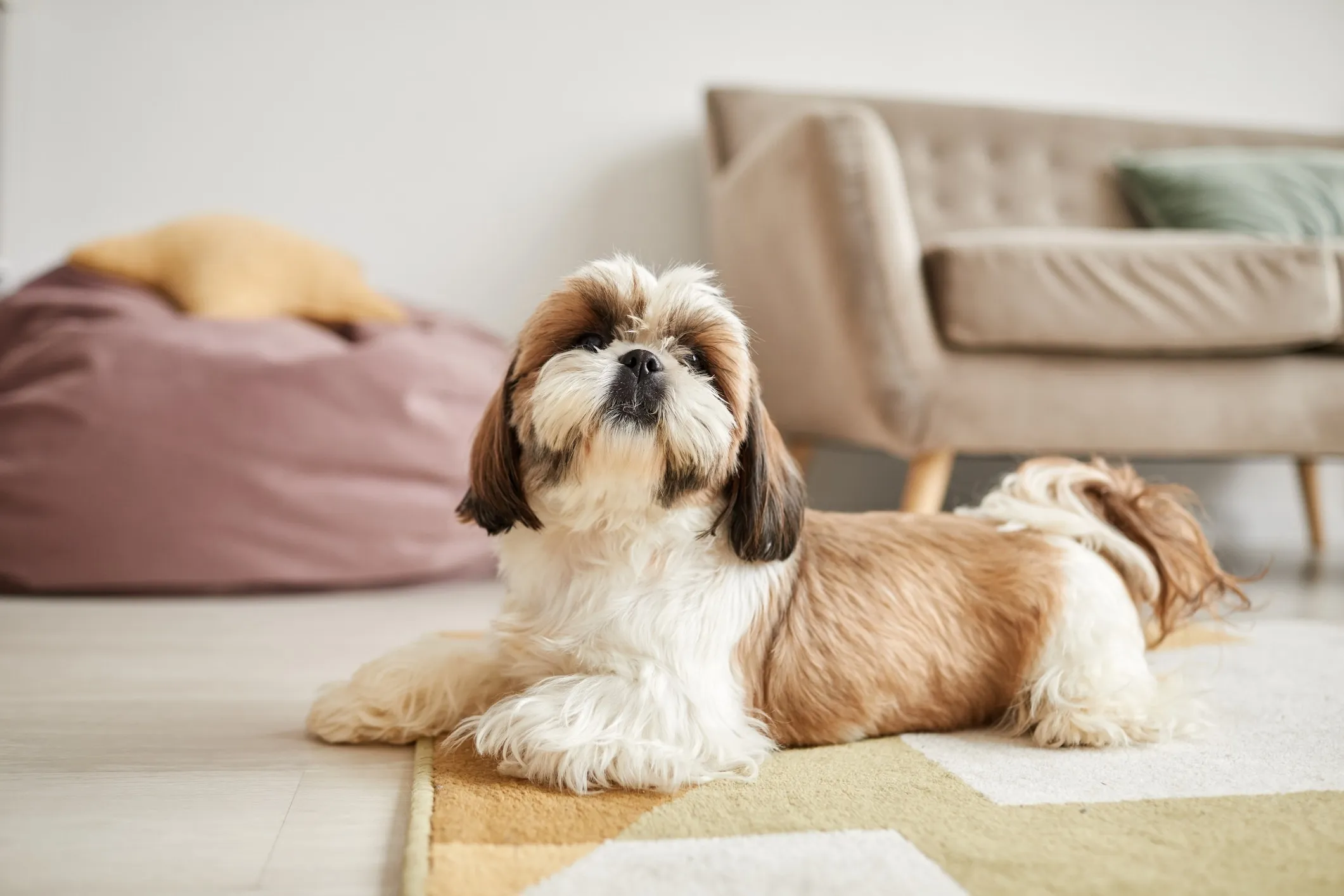 Brown and white Shih Tzu lying on a living room floor
Brown and white Shih Tzu lying on a living room floor
The Shih Tzu is an ancient companion breed with a luxurious, flowing double coat that is surprisingly low-shedding. Weighing 9-16 pounds, these friendly and outgoing dogs were originally bred to be lap warmers for Chinese royalty. Their long hair requires daily brushing and regular professional grooming to prevent matting and keep them comfortable. While generally healthy, their brachycephalic (flat) face can make them prone to certain issues like overheating and breathing difficulties, especially in warm weather. Despite these considerations, a well-cared-for Shih Tzu is a delightful, affectionate, and relatively active companion, perfectly suited for those seeking a small, charming, and low-shedding pet.
4. Miniature Schnauzer
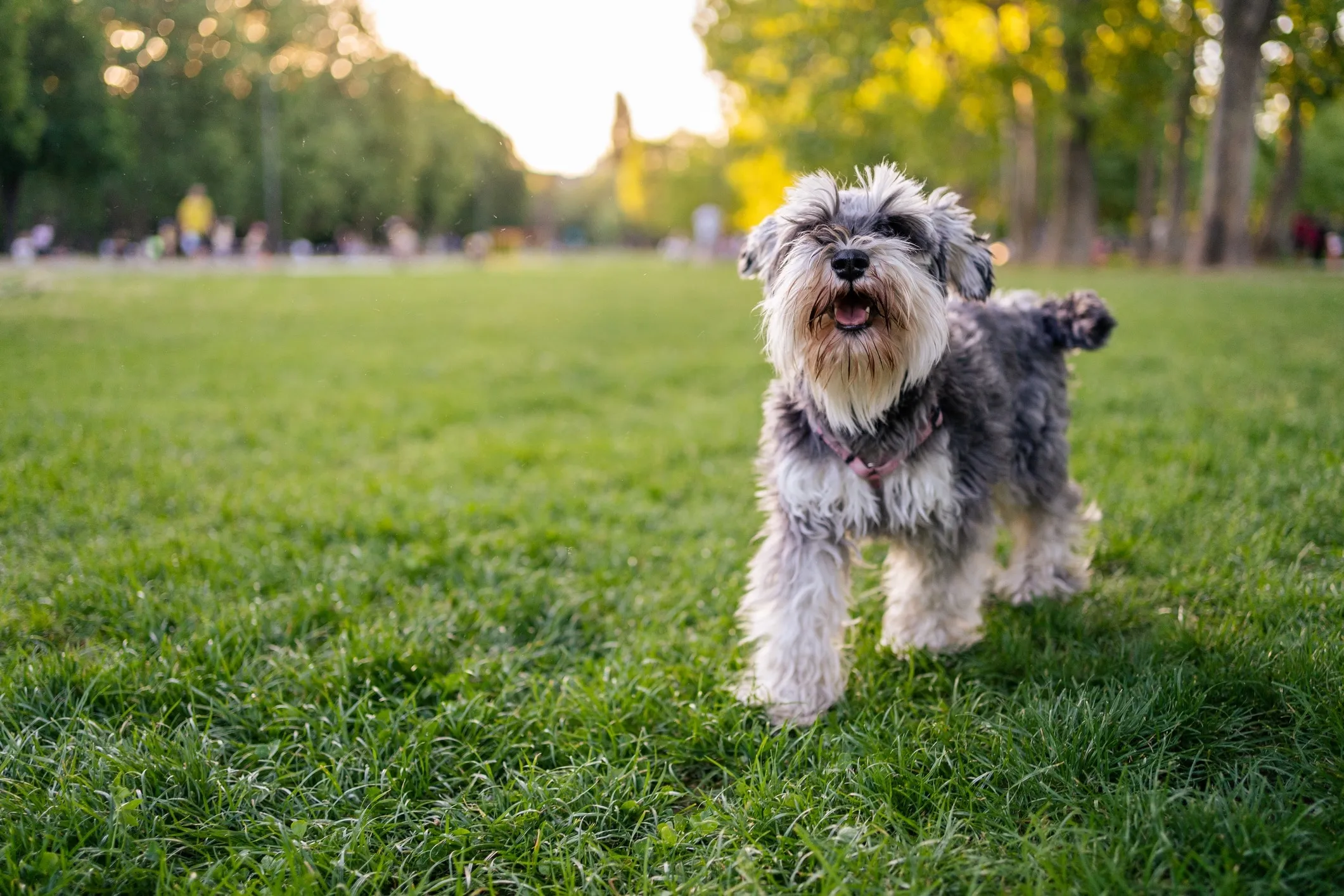 Salt and pepper Miniature Schnauzer wearing a pink harness in a park
Salt and pepper Miniature Schnauzer wearing a pink harness in a park
The Miniature Schnauzer is a robust and intelligent small dog, typically weighing 11-20 pounds and standing 12-14 inches tall. Their distinctive wiry double coat sheds minimally, making them a great choice for allergy sufferers. This breed is known for its bold personality, sharp wit, and playful nature. Miniature Schnauzers require regular grooming, including hand-stripping or clipping every 5-8 weeks to maintain their coat texture and minimize shedding. They are energetic and require at least an hour of exercise daily to keep them happy and well-behaved. Their alert nature and strong loyalty also make them excellent watchdogs, despite their small size.
5. Bichon Frise
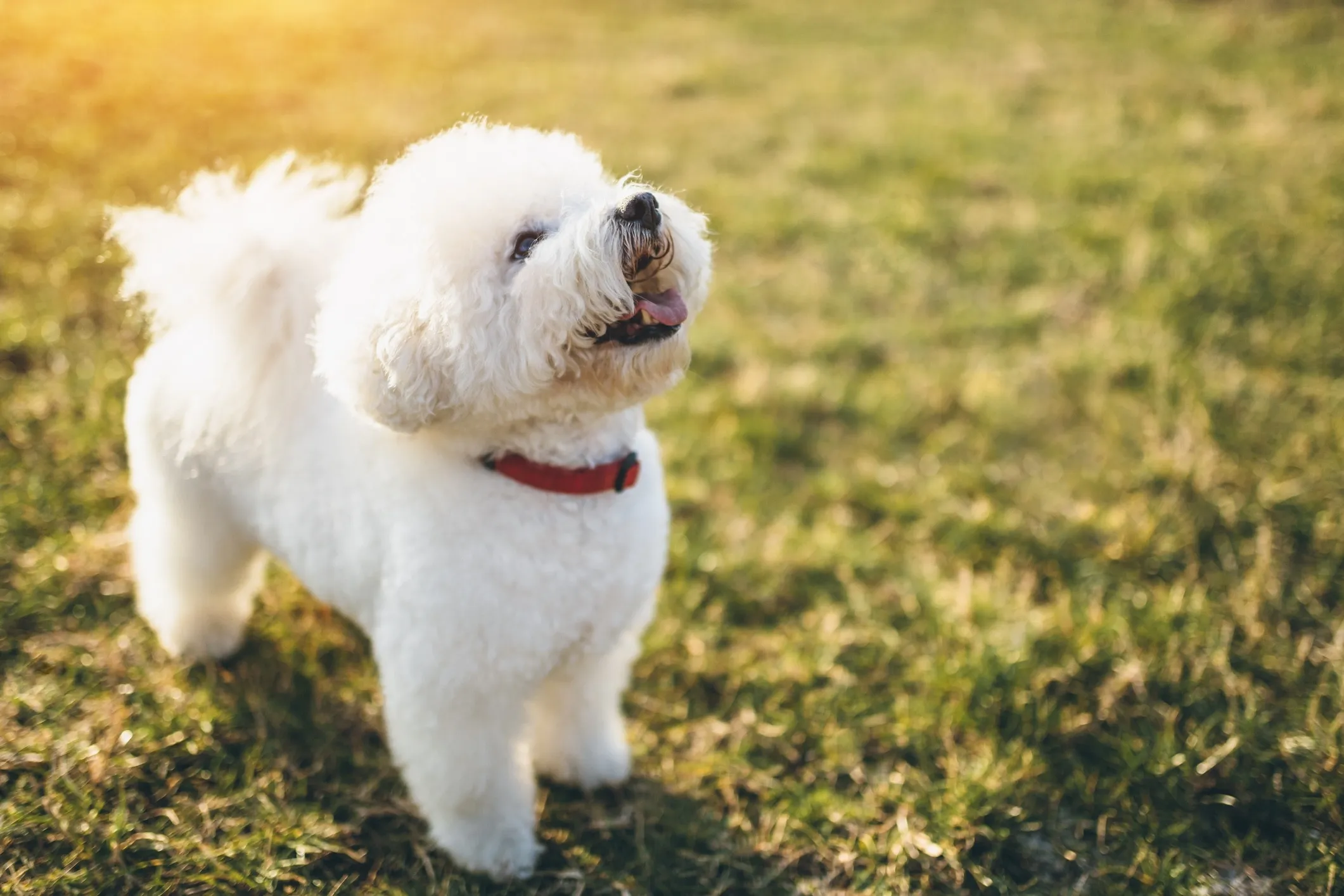 White Bichon Frise dog looking up in the grass
White Bichon Frise dog looking up in the grass
With their cheerful disposition and cotton-ball appearance, the Bichon Frise is an endearing small dog breed that rarely sheds. These playful and affectionate pups typically weigh 12-18 pounds and are known for their dense, curly white coats. The Bichon’s coat requires daily brushing and professional grooming every 4-6 weeks to prevent matting and maintain its pristine look. Highly intelligent and trainable, Bichons excel in obedience and can learn a variety of tricks with positive reinforcement. They thrive on companionship and are generally good with children and other pets, making them a wonderful gentle dog breed that doesn’t shed for many families.
6. Chinese Crested
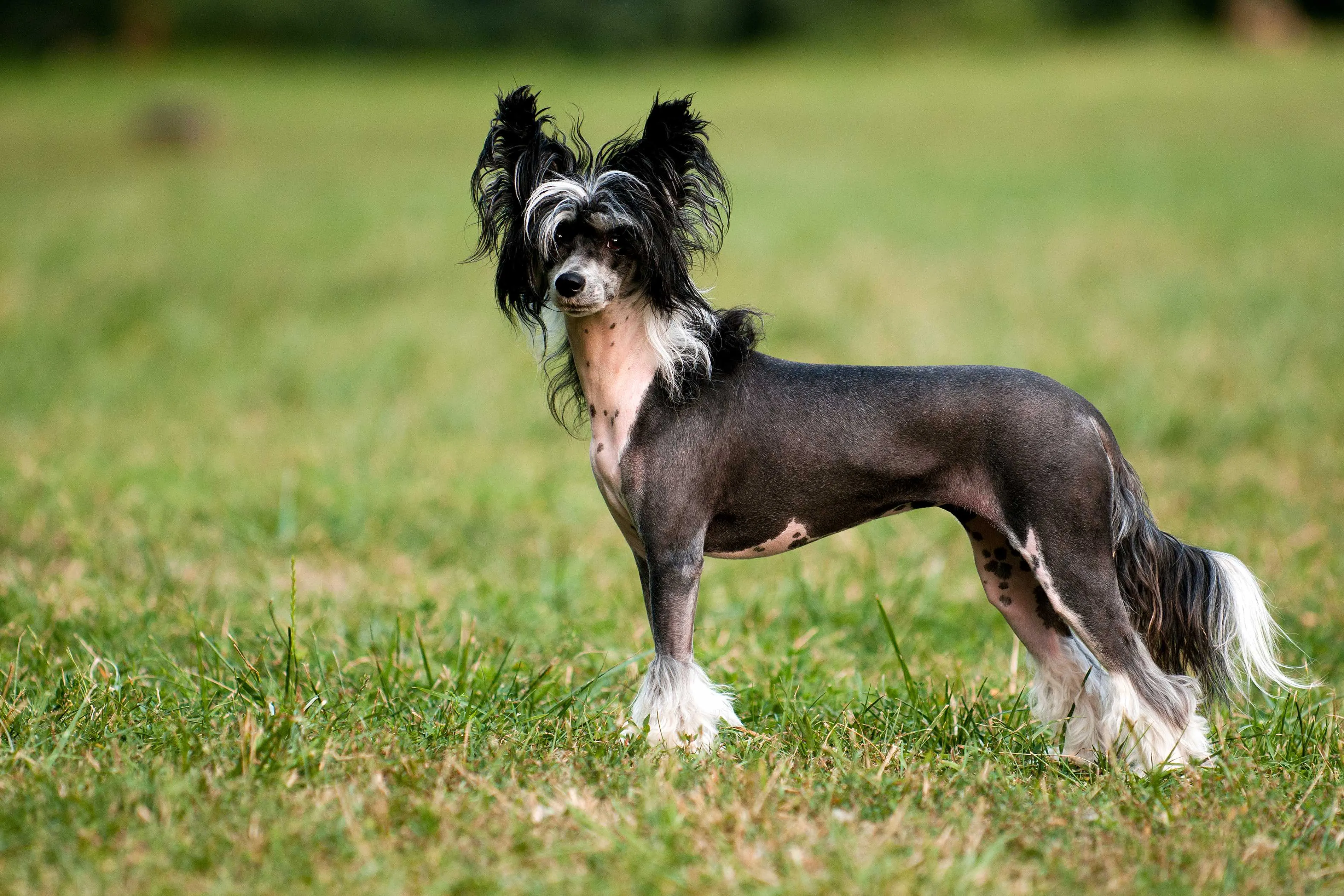 Black hairless Chinese Crested looking at the camera
Black hairless Chinese Crested looking at the camera
The Chinese Crested is a unique and captivating small breed, offering two distinct varieties: Hairless and Powderpuff, both considered hypoallergenic. The Hairless variety has smooth, soft skin with tufts of hair on its head, tail, and paws, requiring skin care to prevent sunburn and dryness. The Powderpuff, on the other hand, is covered in a full, silky coat that sheds minimally but needs regular brushing. Weighing 10-13 pounds, these dogs are playful, affectionate, and devoted companions. Their small size and moderate exercise needs make them well-suited for apartment living. They are known for their gentle and loving nature, forming strong bonds with their families.
7. Affenpinscher
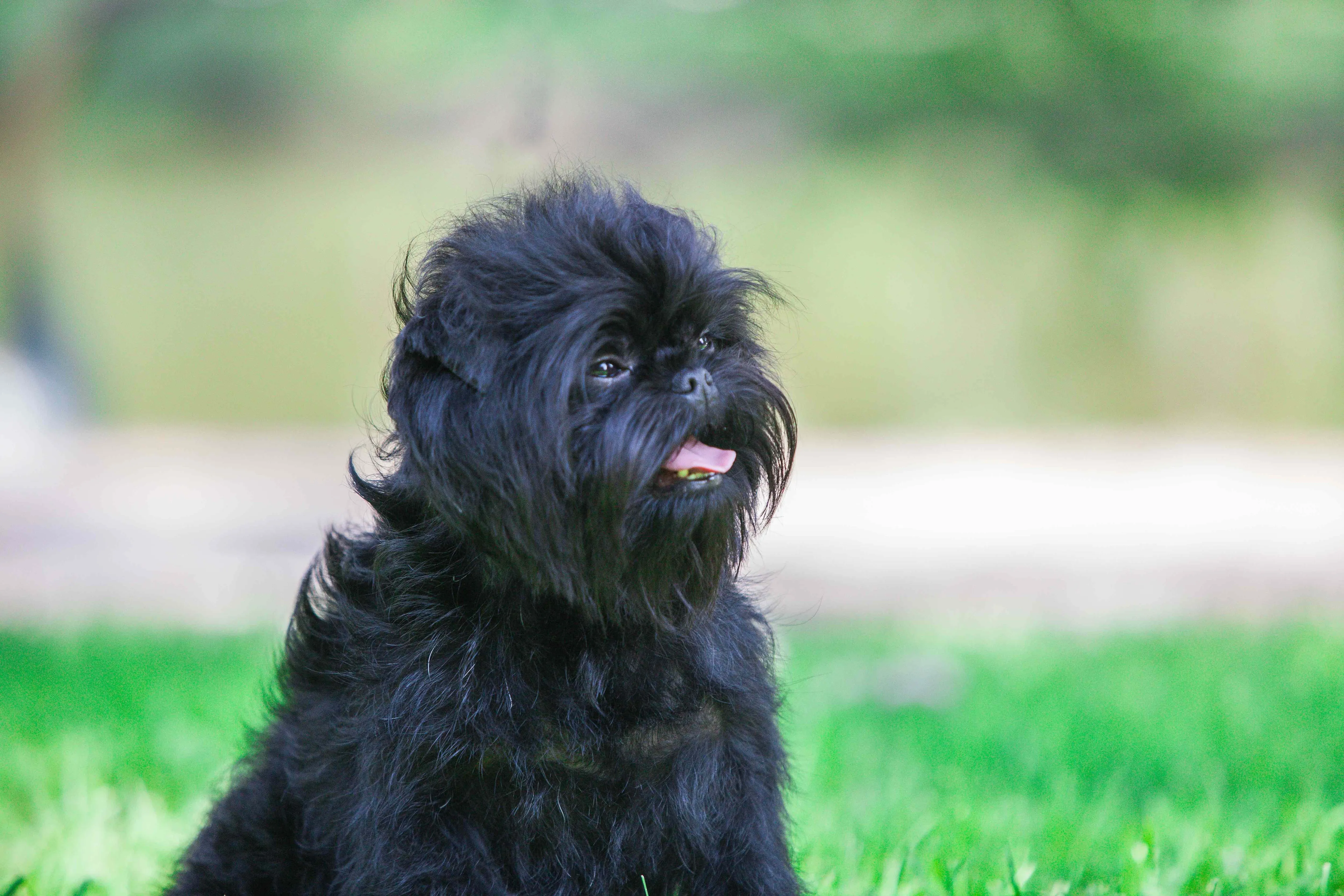 Black Affenpinscher dog close-up
Black Affenpinscher dog close-up
The Affenpinscher, often described as “monkey-like,” is a small, curious, and amusing toy breed, typically weighing 7-10 pounds. Their dense, wiry coat produces very little dander, making them an excellent choice for allergy sufferers. While low-shedding, their coat requires diligent care, including regular brushing and professional hand-stripping to maintain its texture and prevent matting. Affenpinschers are known for their bold, mischievous personalities and thrive on attention from their families. They are intelligent and generally respond well to training, though they can be quite stubborn. Their small size makes them ideal for various living spaces, including apartments.
8. Bolognese
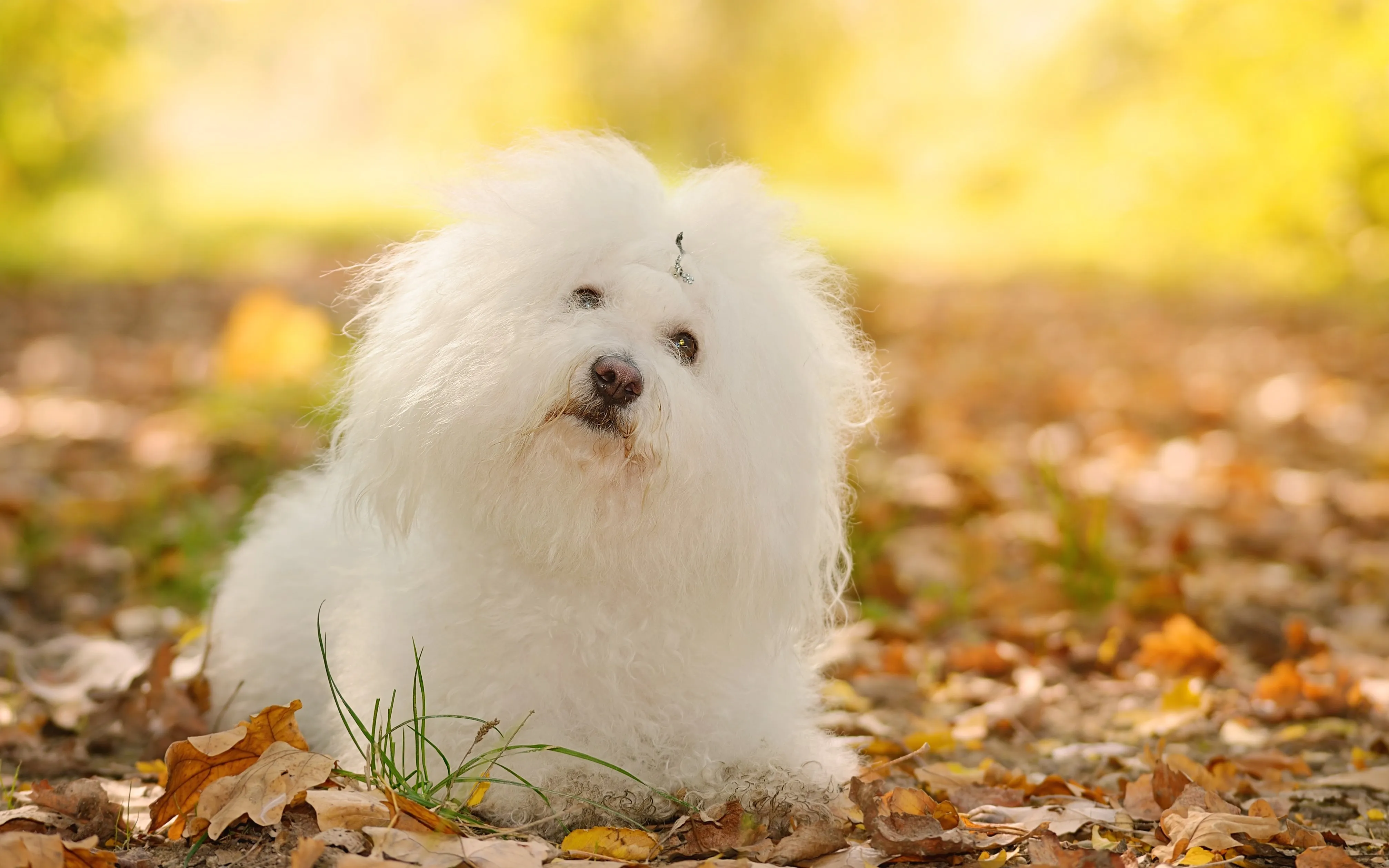 White Bolognese dog sitting in an autumn forest
White Bolognese dog sitting in an autumn forest
Originating from Italy, the Bolognese is a delightful small dog, typically weighing 5.5-9 pounds, with a long, fluffy, pure white coat that is distinctly low-shedding. Despite their messy-chic appearance, their cotton-like coat requires dedicated grooming to prevent tangles and matting. Daily brushing and regular professional grooming are essential. Bolognese dogs are known for their playful, easygoing, and affectionate personalities. They bond strongly with their families and are generally good with children and other pets. Their calm demeanor and adaptability make them suitable for almost any living situation, from bustling family homes to quiet apartments.
9. Maltese
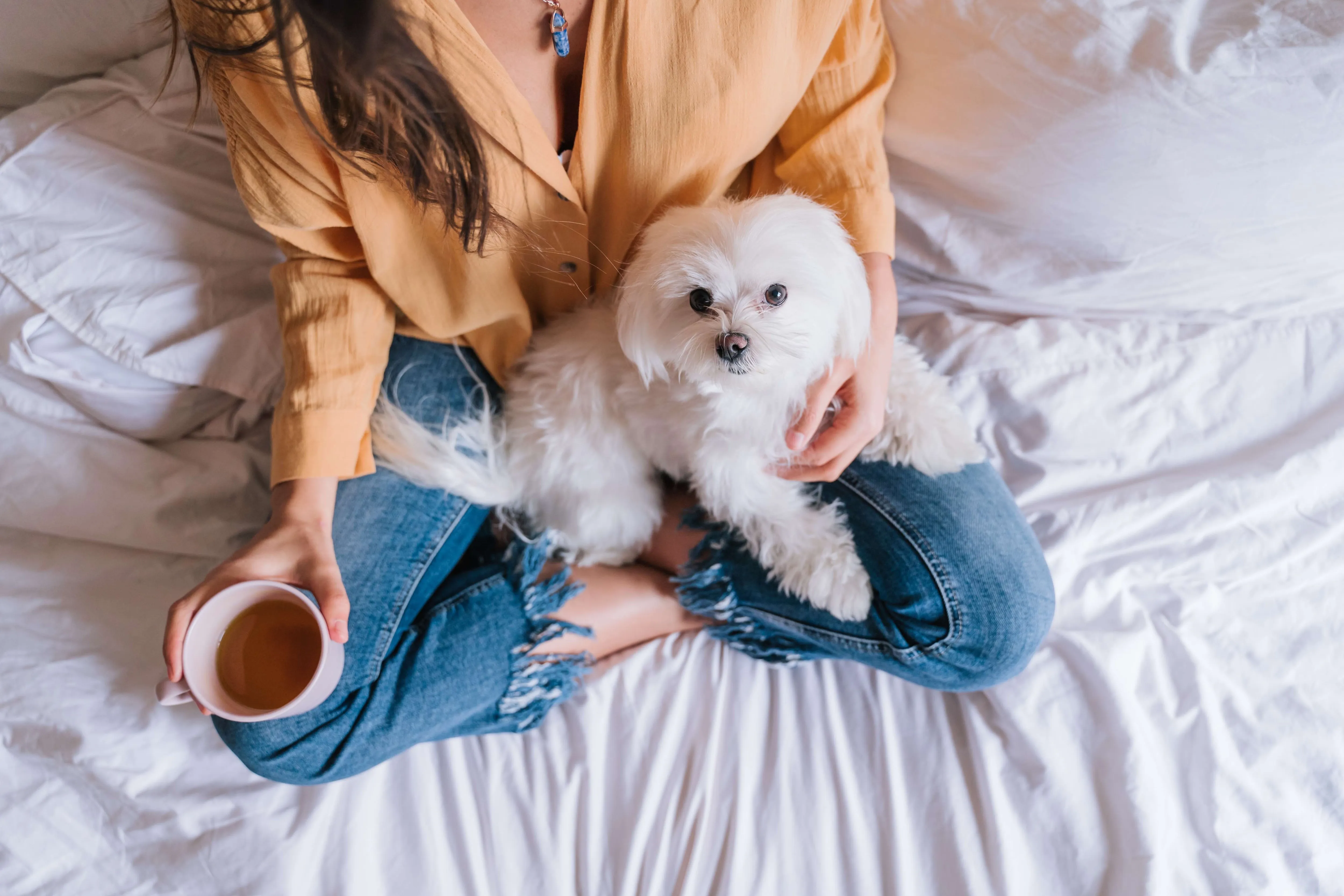 Woman holding a white Maltese dog on a bed
Woman holding a white Maltese dog on a bed
The Maltese is a small, elegant toy breed renowned for its long, flowing, pure white coat that is remarkably low-shedding. Weighing typically under 7 pounds, these affectionate and playful dogs make charming companions. Their luxurious coat requires daily brushing to prevent tangles and maintain its pristine appearance. Many owners opt for a shorter “puppy cut” to simplify grooming. Maltese dogs are intelligent, gentle, and thrive on human companionship. They are generally good-natured and can be quite lively, enjoying short play sessions and leisurely walks. Their small size and minimal shedding make them an ideal choice for apartment dwellers and those with allergies.
10. Coton de Tulear
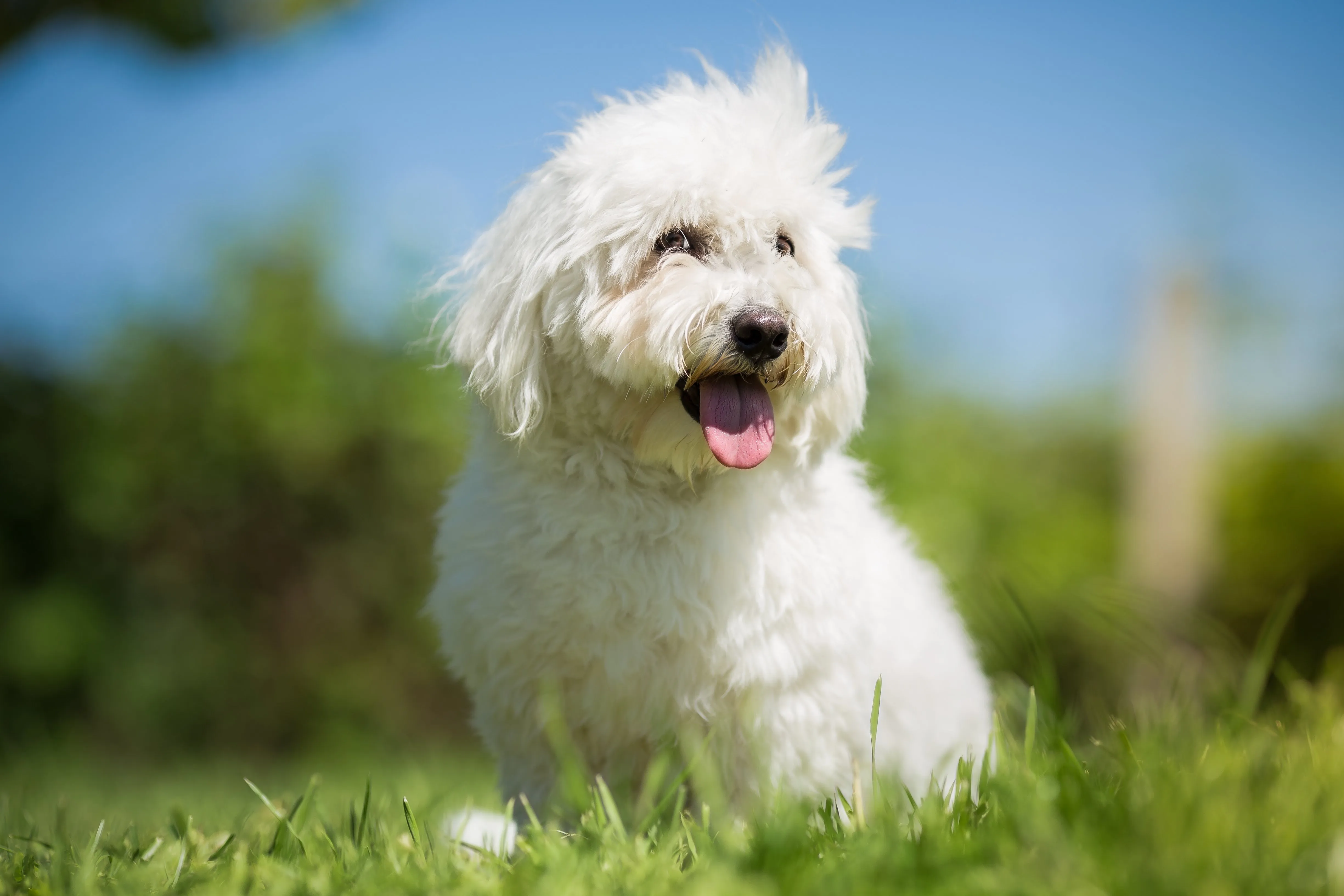 White Coton de Tulear sitting in grass with hair blowing in the wind
White Coton de Tulear sitting in grass with hair blowing in the wind
Hailing from Madagascar, the Coton de Tulear is a small, easygoing dog, typically weighing 8-15 pounds. Their signature soft, cotton-like coat is low-shedding, making them a good option for allergy sufferers. This distinctive coat requires regular brushing—ideally daily—to prevent matting, especially after outdoor play. Cotons are known for their cheerful and outgoing personalities, forming strong bonds with their families. They are adaptable and generally get along well with children and other pets, provided proper introductions are made. Their playful nature combined with their intelligence makes them a joy to train and live with.
11. Schnoodle
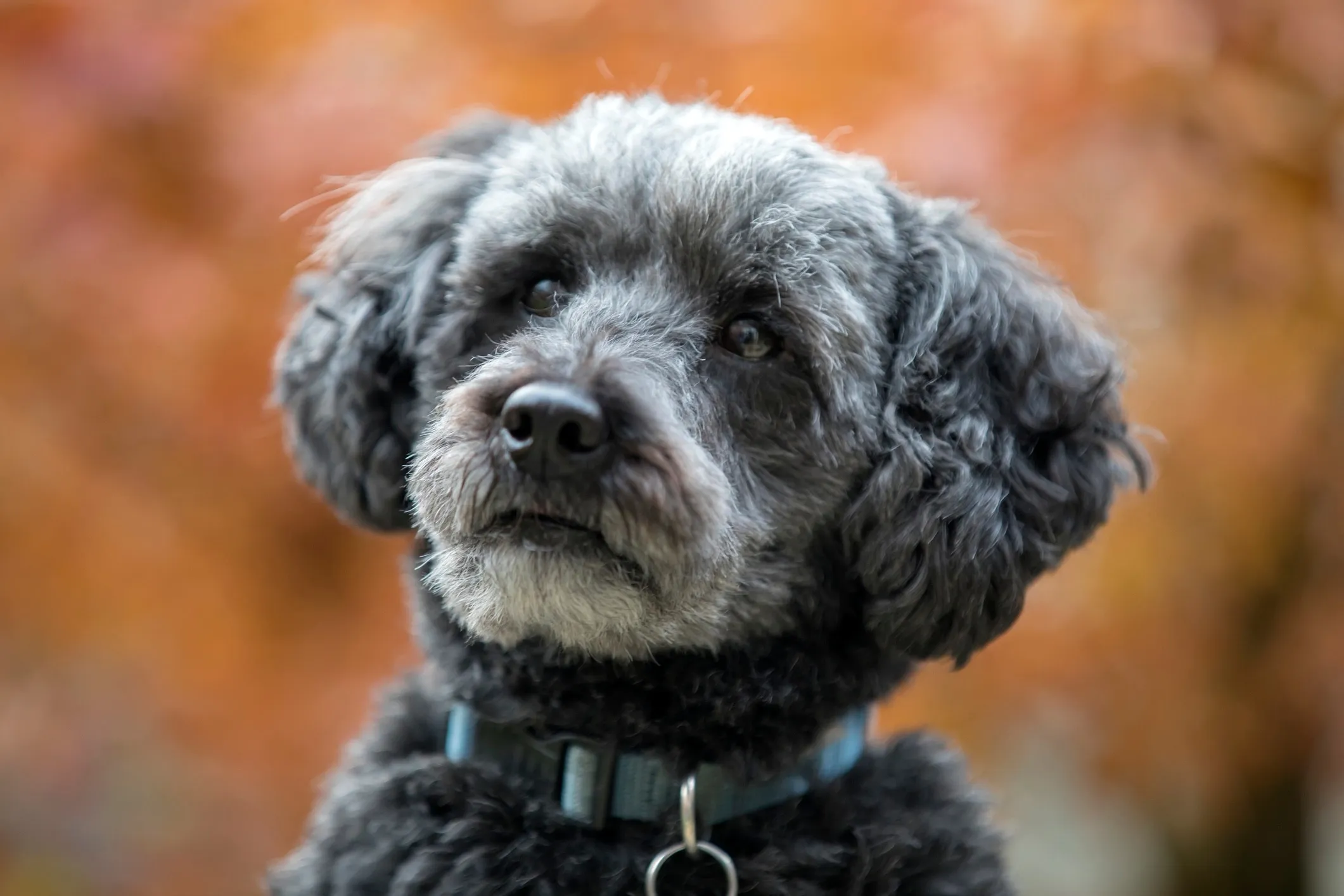 Gray Schnoodle close-up
Gray Schnoodle close-up
The Schnoodle is a charming hybrid breed, a cross between a Schnauzer and a Poodle. Both parent breeds are known for their low-shedding qualities, making the Schnoodle an excellent choice for allergy sufferers, especially when the Miniature Poodle and Miniature Schnauzer are crossed. Their coat can vary from wavy to curly, depending on the genetics inherited, but it is consistently low-shedding. Schnoodles are intelligent, playful, and generally eager to please, making them highly trainable. Their size can vary, but many fall into the small to medium range, typically 10-20 pounds. Regular grooming is necessary to keep their coats free of mats and looking their best.
12. Bedlington Terrier
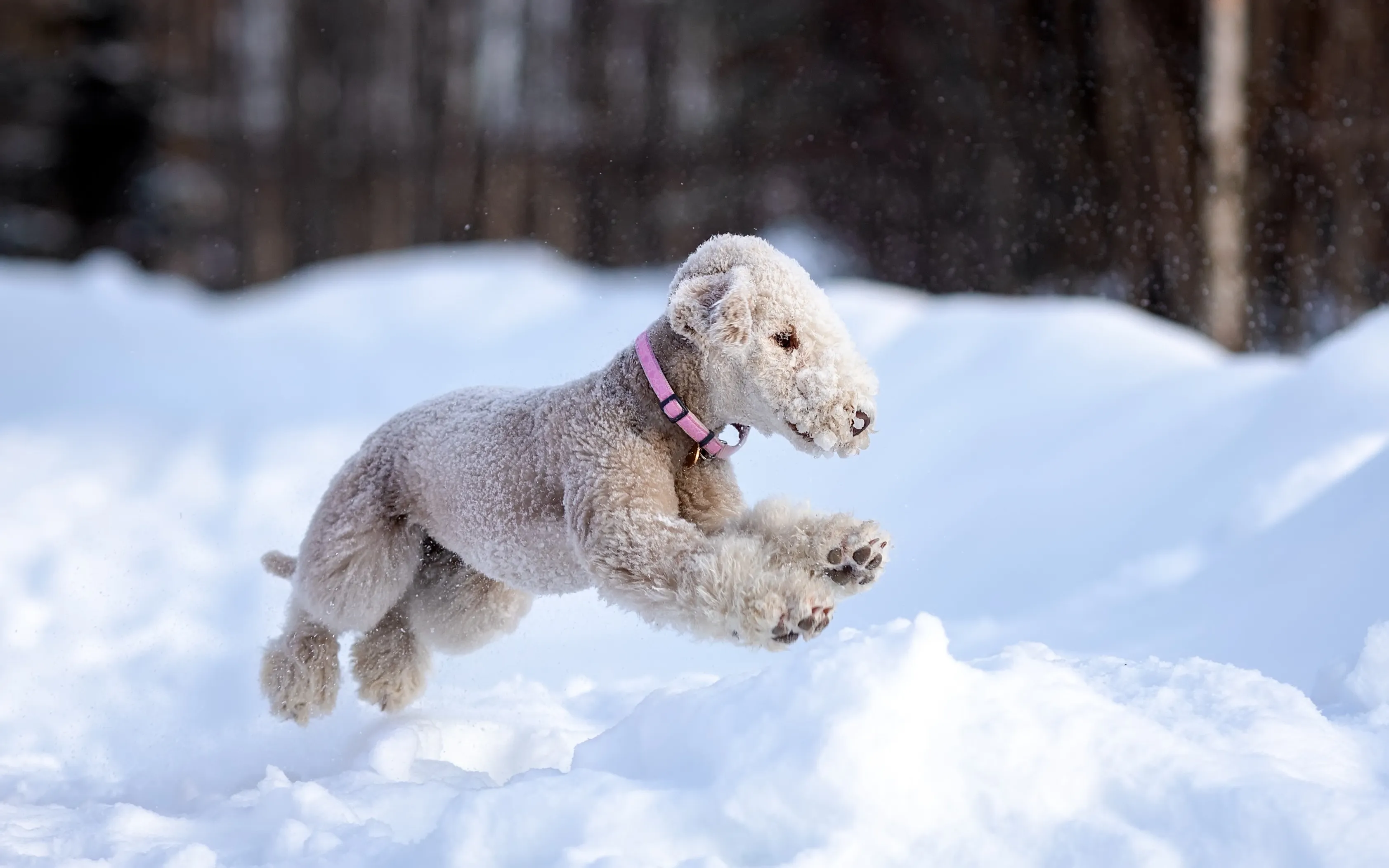 White Bedlington Terrier running through snow
White Bedlington Terrier running through snow
Often described as “a lamb in dog’s clothing,” the Bedlington Terrier is a distinctive small to medium-sized breed, usually weighing 17-23 pounds. Their unique linty, woolly coat is low-shedding and has a coarse texture, which makes them suitable for allergy sufferers. This coat requires regular grooming, including clipping every 6-8 weeks, to maintain its iconic look. Bedlington Terriers are known for their affectionate nature and desire to be close to their people. They are intelligent and energetic, requiring daily exercise and mental stimulation. With proper socialization and training, they are loyal and charming companions.
13. Xoloitzcuintli (Toy & Miniature)
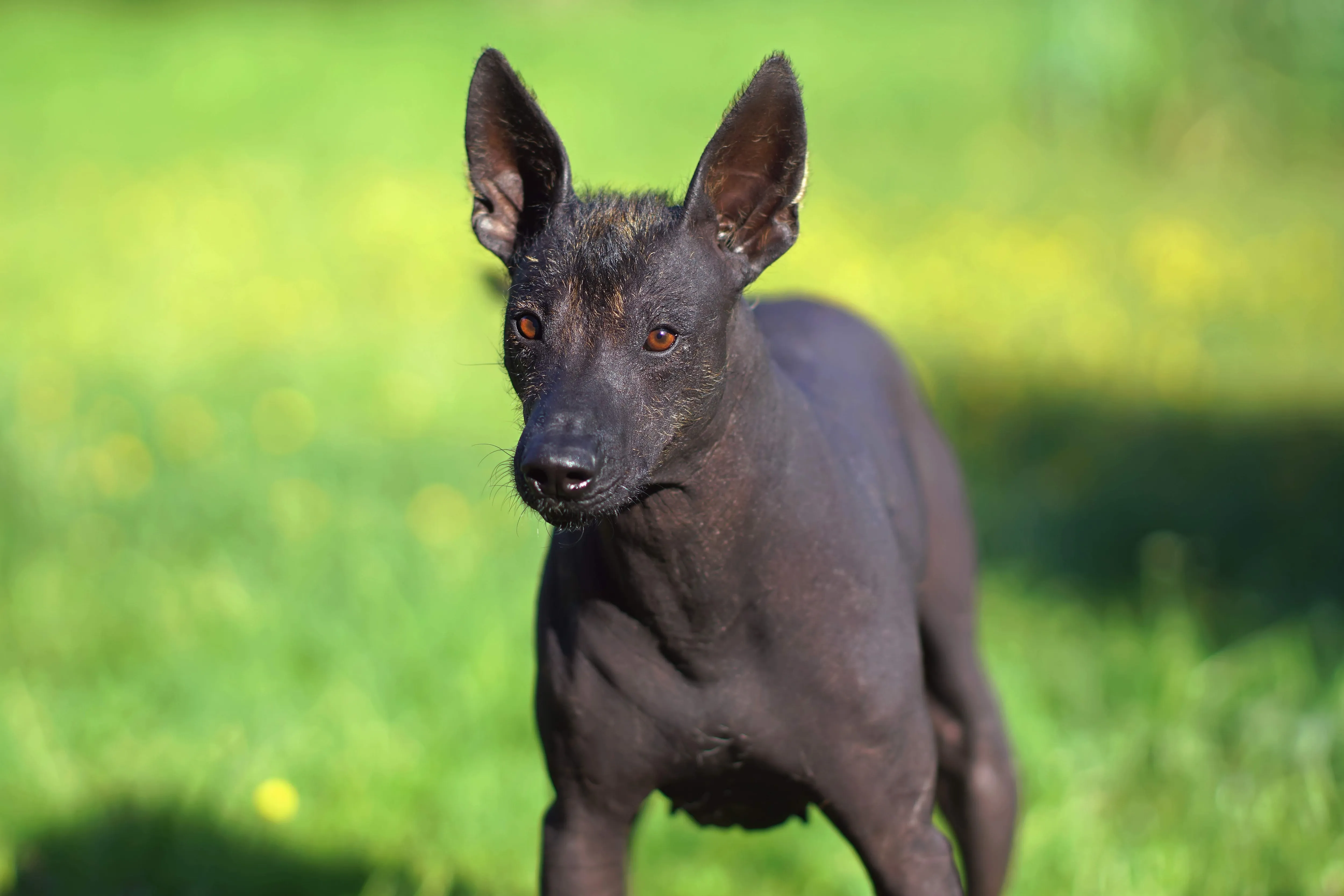 Black Mexican Hairless Dog standing in grass
Black Mexican Hairless Dog standing in grass
The Xoloitzcuintli, or Mexican Hairless Dog, is an ancient and rare breed that comes in three sizes: toy, miniature, and standard. The toy and miniature varieties are excellent choices for those seeking a small, low-allergen dog. They can be hairless, requiring skin protection from sun and cold, or coated with a short, dense, low-shedding coat. Toy Xolos typically weigh 10-15 pounds, while Miniatures weigh 15-30 pounds. Xolos are known for their calm, vigilant, and loyal nature. They form strong bonds with their families and are generally good with children when socialized early. Their minimal grooming needs for the hairless variety and low shedding for the coated make them quite low-maintenance in terms of hair.
14. Whoodle
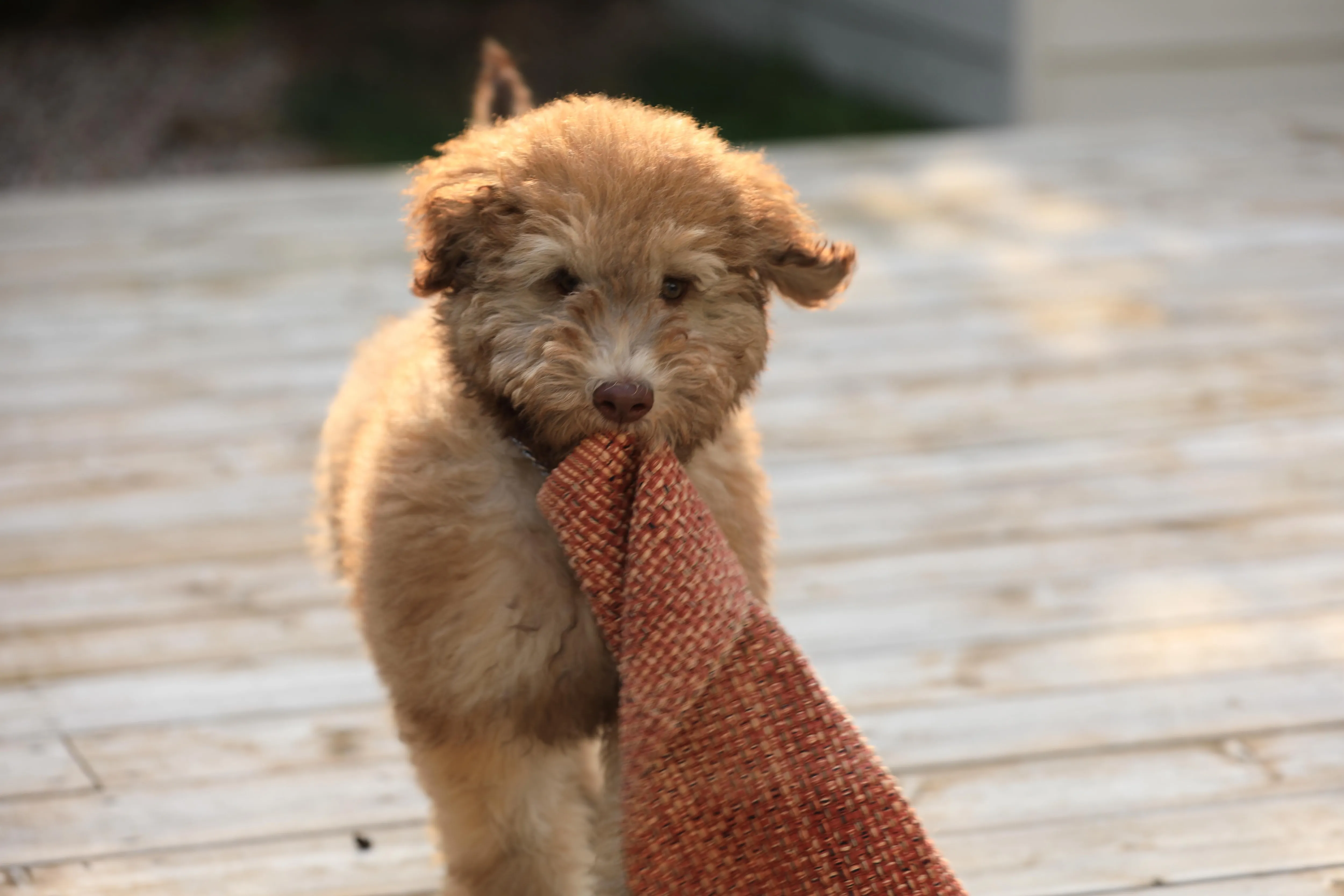 Tan Whoodle puppy dragging a wash cloth
Tan Whoodle puppy dragging a wash cloth
The Whoodle is a delightful cross between a Soft-Coated Wheaten Terrier and a Poodle, two breeds celebrated for their low-shedding coats. The resulting Whoodle inherits these desirable traits, offering a friendly, intelligent, and affectionate companion with a soft, wavy to curly coat that sheds minimally. While sizes can vary, many Whoodles fall into the small to medium range (20-40 pounds), making them suitable for many homes. They are known for their vivacious personalities and require regular exercise and mental engagement. Like their parent breeds, Whoodles need consistent grooming to prevent matting and keep their coats healthy.
15. Shorkie
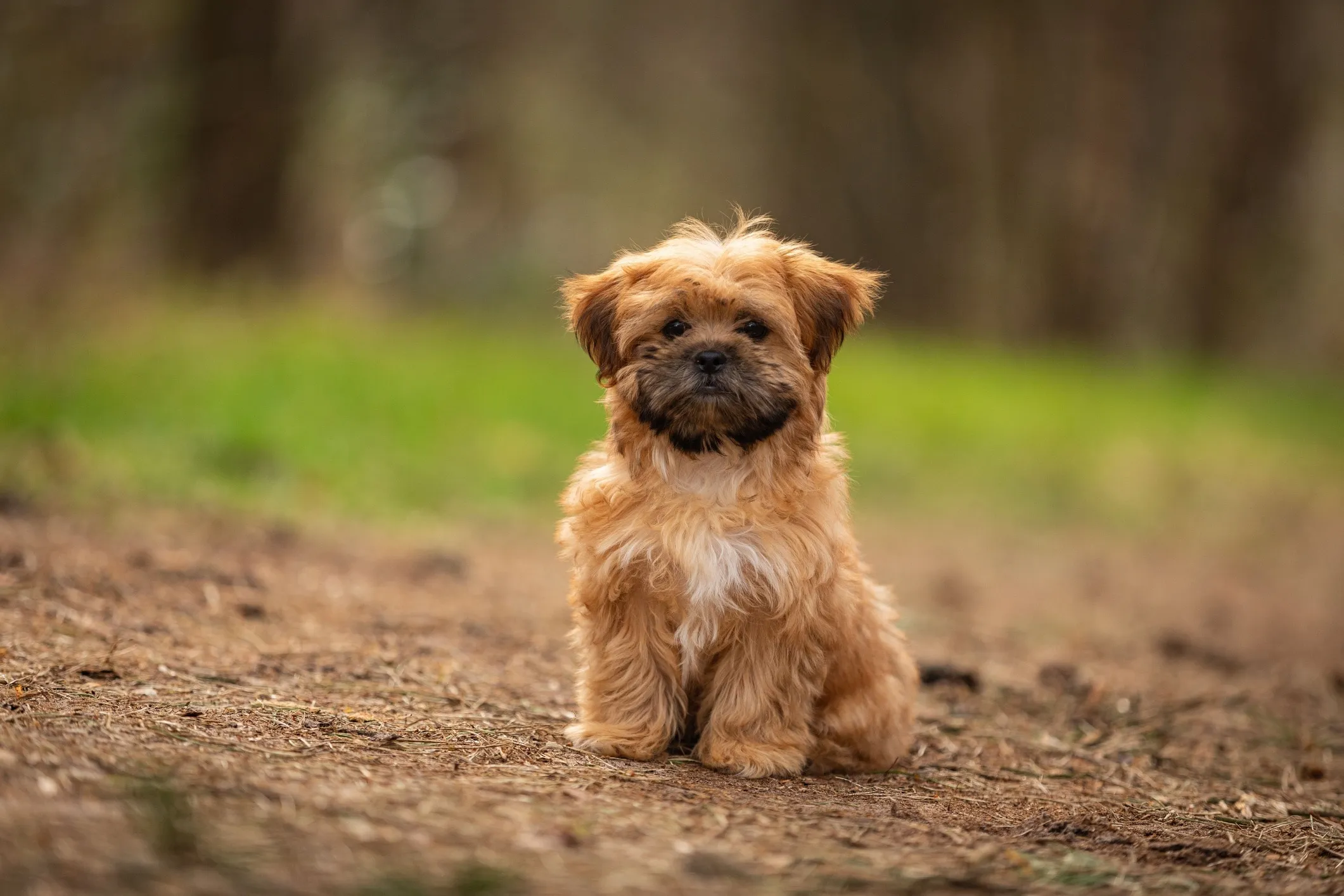 Tan and black Shih Tzu and Yorkie mix sitting on a hiking trail
Tan and black Shih Tzu and Yorkie mix sitting on a hiking trail
The Shorkie is a charming mixed breed, combining the low-shedding qualities of the Shih Tzu and the Yorkshire Terrier. These small dogs, typically weighing 5-12 pounds, are a delightful blend of their parents’ best traits: playful, friendly, and deeply affectionate. Their long, silky coat is low-shedding but does require regular grooming to keep it free of tangles and mats. Shorkies thrive on human companionship and are well-suited for families or individuals who can provide consistent attention. Their petite size makes them perfect for apartment living, and their lively disposition ensures there’s never a dull moment.
16. Shih-Poo
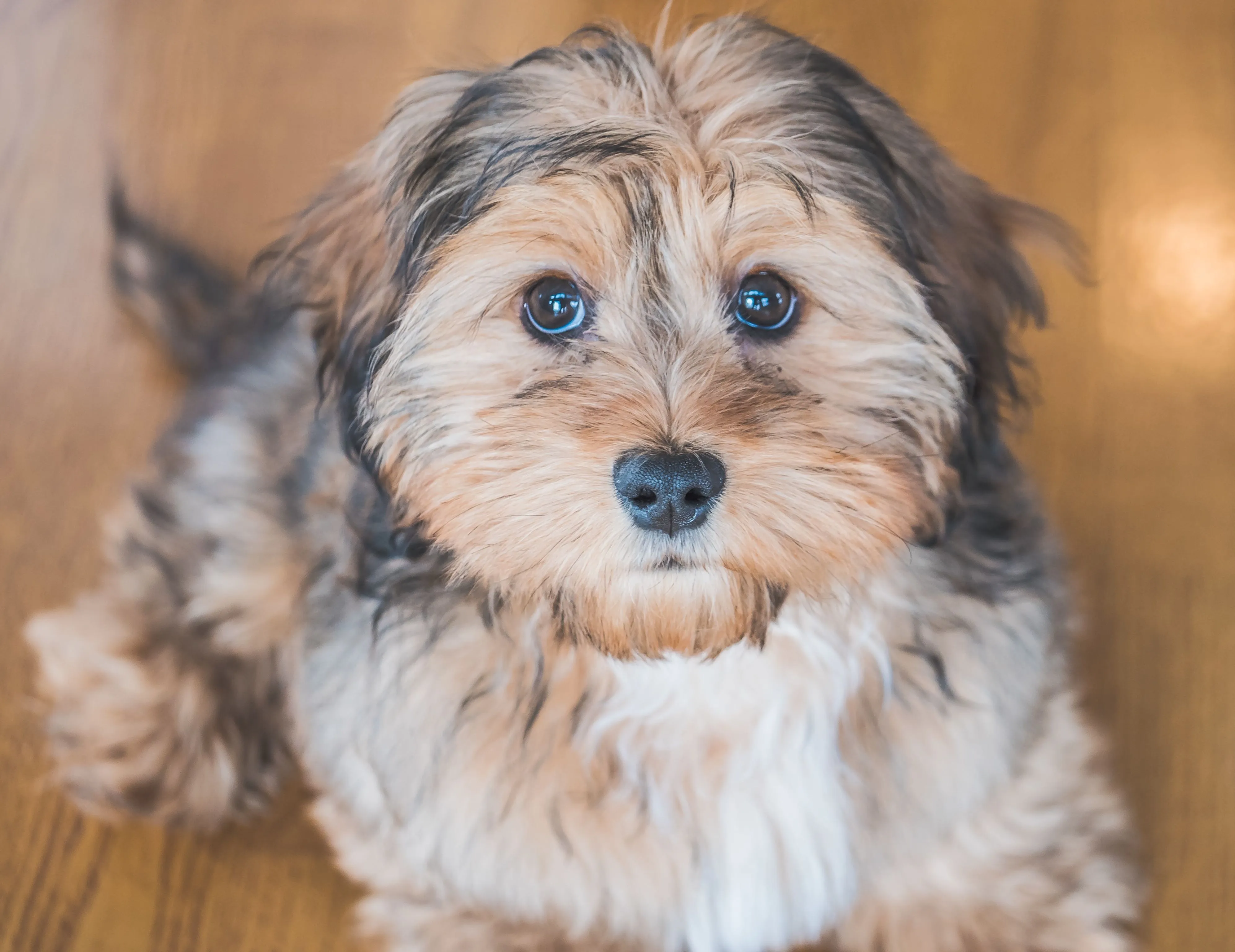 Tan and black Shih-Poo dog close-up
Tan and black Shih-Poo dog close-up
Another popular “designer dog,” the Shih-Poo is a cross between a Shih Tzu and a Toy Poodle, guaranteeing a small, low-shedding companion. These adorable pups typically weigh 7-15 pounds and possess a charming, playful, and intelligent personality. Their coat, which can range from wavy to curly, is low-shedding but requires daily brushing and regular professional grooming to prevent matting. Shih-Poos are highly adaptable and can flourish in almost any living situation, from a small apartment to a larger home, as long as they receive about 30 minutes of daily exercise and plenty of cuddles. They are known for their friendly demeanor and ability to get along well with everyone.
17. Malshi
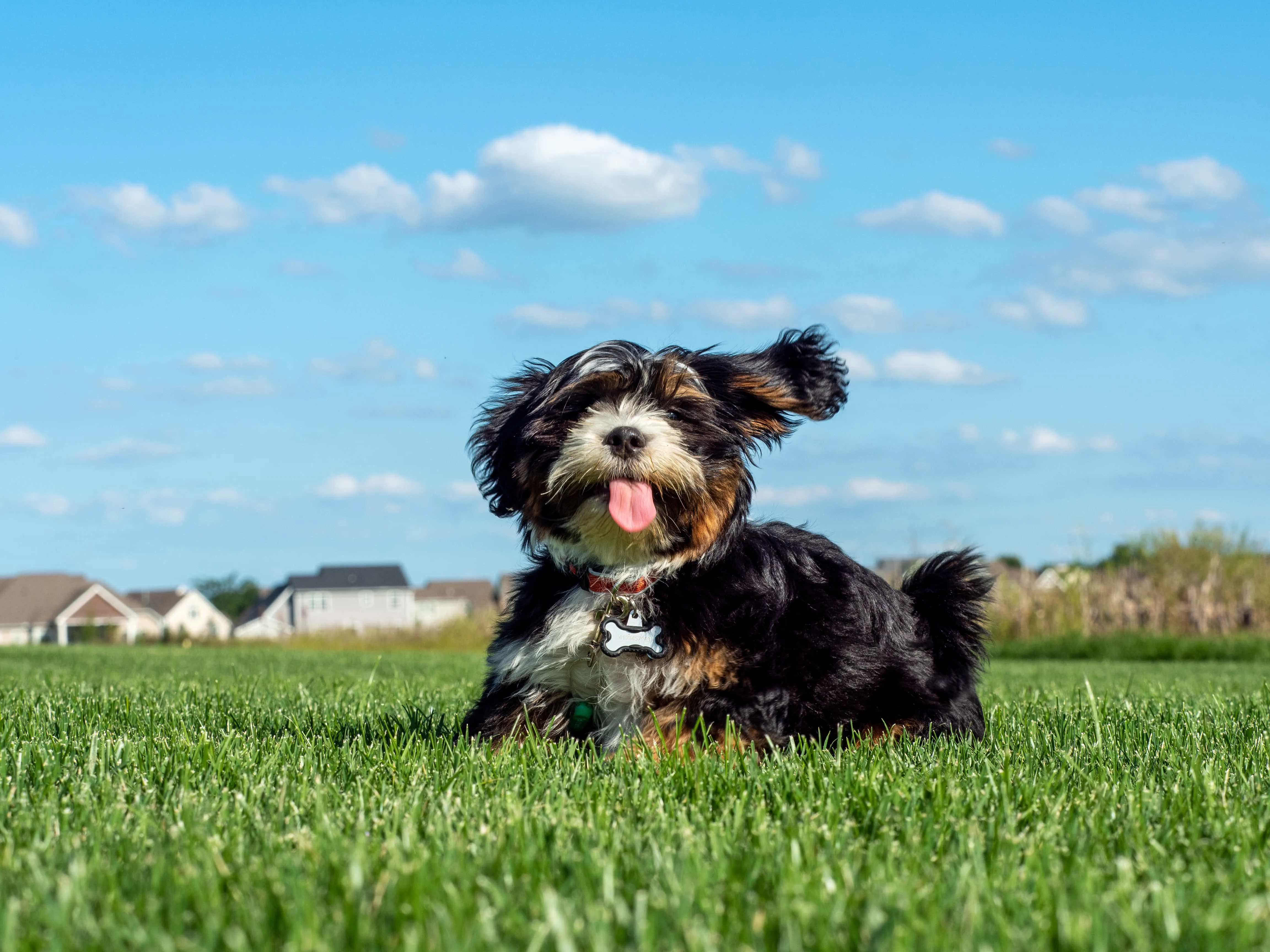 Tricolor Malshi dog in green grass
Tricolor Malshi dog in green grass
The Malshi is a sweet and happy crossbreed resulting from the pairing of a Maltese and a Shih Tzu. These small dogs typically weigh 6-12 pounds and embody the affectionate and playful traits of both parent breeds. Their soft, flowing coat is low-shedding but, like their Maltese and Shih Tzu parents, requires consistent grooming to prevent tangles and matting. Malshis thrive on close companionship and enjoy being at the center of family life. They are gentle and adaptable, making them excellent pets for individuals or families seeking a devoted, low-shedding small dog that loves to cuddle.
18. Peruvian Inca Orchid (Small)
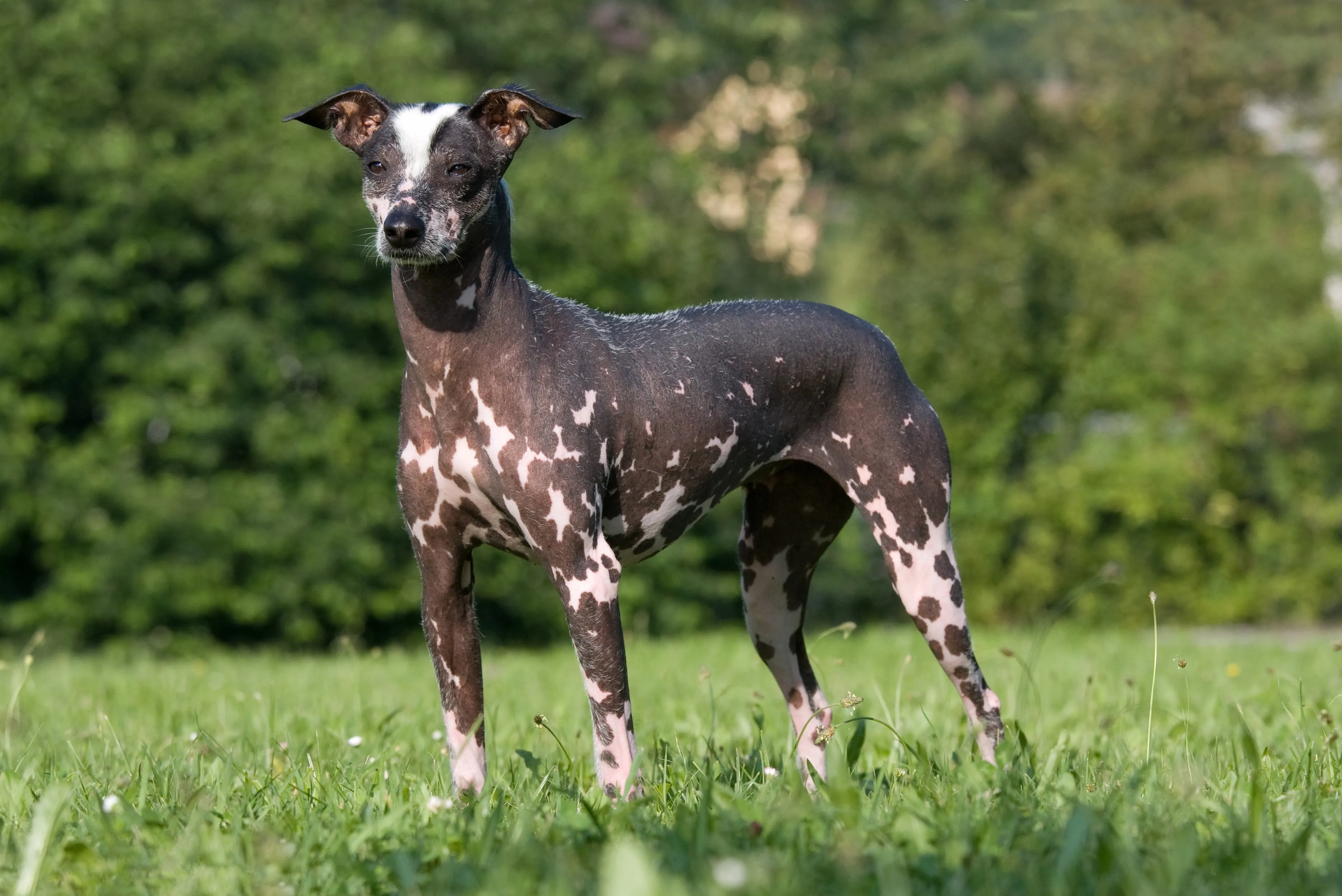 Peruvian Inca Orchid dog
Peruvian Inca Orchid dog
The Peruvian Inca Orchid, an ancient breed and national dog of Peru, is another excellent choice for allergy sufferers, particularly its small and medium varieties. The small size typically weighs 8-18 pounds. Like the Xoloitzcuintli, this breed comes in hairless and coated varieties. The hairless version is nearly completely bald, significantly reducing dander release, while the coated version has a short, low-shedding single coat. They are elegant, agile, and alert dogs known for their loyalty and protective nature towards their families. While they can be reserved with strangers, they are loving and affectionate with their inner circle. Their unique appearance and minimal shedding make them a fascinating and practical choice for allergy-prone owners.
Caring for Your Low-Shedding Small Dog
While these breeds shed less, they are not maintenance-free. Proper care is crucial for their health and to maximize their allergy-friendly qualities.
Grooming Essentials for Low-Shedding Coats
Many low-shedding breeds, especially those with curly or long coats, require more intensive grooming than their shedding counterparts. The hair that doesn’t fall out often gets trapped in their coat, leading to mats and tangles if not brushed regularly.
- Regular Brushing: Most low-shedding small dogs need daily or at least every-other-day brushing. This helps remove loose hair and dander, preventing mats and distributing natural skin oils. Specific brushes like slicker brushes and pin brushes are ideal for different coat types.
- Professional Grooming: Many breeds on this list, like Poodles, Bichons, and Schnauzers, require professional clipping every 4-8 weeks to maintain their coat length and health. Budgeting for this is important.
- Bathing: Regular bathing (every 4-6 weeks) helps wash away dander and allergens from the coat. Use a veterinarian-approved shampoo, especially if your dog has sensitive skin.
- Skin Care for Hairless Breeds: For breeds like the Chinese Crested (Hairless) and Xoloitzcuintli (Hairless), specialized skin care is vital. This includes moisturizing to prevent dryness and using pet-safe sunscreen to protect against sunburn.
Managing Allergens in Your Home
Even with a low-shedding dog, maintaining a clean home environment is key to minimizing allergens.
- Vacuum Regularly: Use a vacuum cleaner with a HEPA filter to capture pet dander from carpets, rugs, and upholstery.
- Dust Frequently: Wipe down surfaces with a damp cloth to pick up settled dander.
- Wash Bedding: Regularly wash your pet’s bedding and your own bedding in hot water.
- Air Purification: Consider using air purifiers with HEPA filters to reduce airborne allergens.
- Designated “Allergen-Free” Zones: If allergies are severe, designate certain areas of your home (like the bedroom) as pet-free zones.
Diet and Health Considerations for Small Breeds
Small dog breeds have unique nutritional needs. They often have faster metabolisms and smaller stomachs, requiring nutrient-dense foods.
- High-Quality Diet: Feed a diet specifically formulated for small breeds, ensuring it meets their energy requirements and supports a healthy coat.
- Dental Health: Small breeds are prone to dental issues, so regular dental check-ups, teeth brushing, and dental chews are crucial.
- Regular Vet Check-ups: Ensure your small, low-shedding companion receives routine veterinary care, including vaccinations and parasite prevention, to maintain optimal health.
Exercise Needs for Small Dogs
While small in stature, many of these breeds have surprising energy levels.
- Daily Walks and Play: Most small dogs benefit from at least 30 minutes to an hour of daily activity, whether it’s walks, indoor play, or interactive toys.
- Mental Stimulation: Many of these small smart dog breeds that don’t shed also require mental stimulation to prevent boredom and destructive behaviors. Puzzle toys and training sessions are great options.
Conclusion
Choosing a small dog breed that doesn’t shed can truly transform the lives of allergy sufferers, allowing them to experience the profound joy and companionship that only a canine friend can provide. From the intelligent Poodle to the charming Shih Tzu and the unique Chinese Crested, there’s a low-shedding small breed to fit nearly every preference and lifestyle. Remember, while these breeds offer a significant advantage in allergen management, they still require dedicated care, including consistent grooming and a clean living environment. By understanding their needs and preparing accordingly, you can welcome one of these adorable pups into your home and enjoy a life filled with wagging tails and minimal sneezes. Explore these wonderful breeds, find your perfect match, and embark on a rewarding journey with your new best friend.
